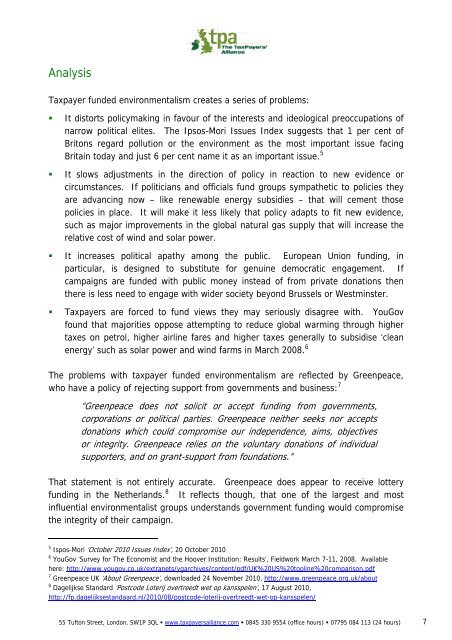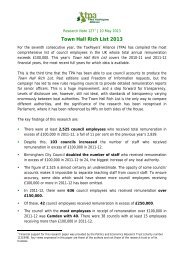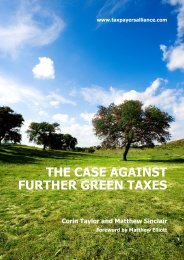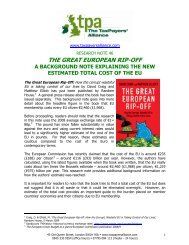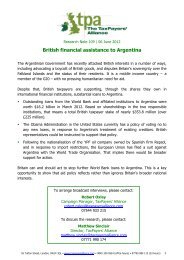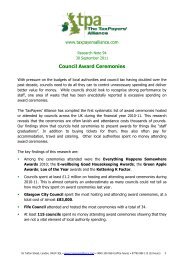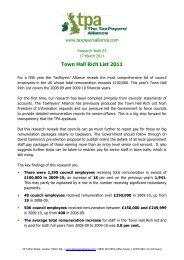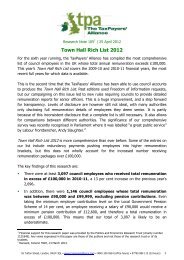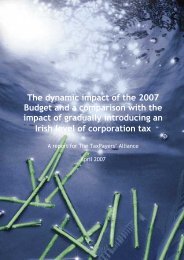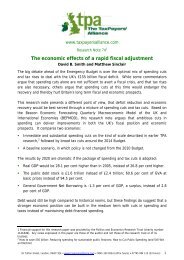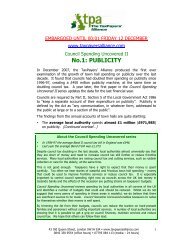Taxpayer Funded Environmentalism - The TaxPayers' Alliance
Taxpayer Funded Environmentalism - The TaxPayers' Alliance
Taxpayer Funded Environmentalism - The TaxPayers' Alliance
Create successful ePaper yourself
Turn your PDF publications into a flip-book with our unique Google optimized e-Paper software.
Analysis<br />
<strong>Taxpayer</strong> funded environmentalism creates a series of problems:<br />
• It distorts policymaking in favour of the interests and ideological preoccupations of<br />
narrow political elites. <strong>The</strong> Ipsos-Mori Issues Index suggests that 1 per cent of<br />
Britons regard pollution or the environment as the most important issue facing<br />
Britain today and just 6 per cent name it as an important issue. 5<br />
• It slows adjustments in the direction of policy in reaction to new evidence or<br />
circumstances. If politicians and officials fund groups sympathetic to policies they<br />
are advancing now – like renewable energy subsidies – that will cement those<br />
policies in place. It will make it less likely that policy adapts to fit new evidence,<br />
such as major improvements in the global natural gas supply that will increase the<br />
relative cost of wind and solar power.<br />
• It increases political apathy among the public. European Union funding, in<br />
particular, is designed to substitute for genuine democratic engagement. If<br />
campaigns are funded with public money instead of from private donations then<br />
there is less need to engage with wider society beyond Brussels or Westminster.<br />
• <strong>Taxpayer</strong>s are forced to fund views they may seriously disagree with. YouGov<br />
found that majorities oppose attempting to reduce global warming through higher<br />
taxes on petrol, higher airline fares and higher taxes generally to subsidise ‘clean<br />
energy’ such as solar power and wind farms in March 2008. 6<br />
<strong>The</strong> problems with taxpayer funded environmentalism are reflected by Greenpeace,<br />
who have a policy of rejecting support from governments and business: 7<br />
“Greenpeace does not solicit or accept funding from governments,<br />
corporations or political parties. Greenpeace neither seeks nor accepts<br />
donations which could compromise our independence, aims, objectives<br />
or integrity. Greenpeace relies on the voluntary donations of individual<br />
supporters, and on grant-support from foundations.”<br />
That statement is not entirely accurate. Greenpeace does appear to receive lottery<br />
funding in the Netherlands. 8 It reflects though, that one of the largest and most<br />
influential environmentalist groups understands government funding would compromise<br />
the integrity of their campaign.<br />
5 Ispos-Mori ‘October 2010 Issues Index’, 20 October 2010<br />
6 YouGov ‘Survey for <strong>The</strong> Economist and the Hoover Institution: Results’, Fieldwork March 7-11, 2008. Available<br />
here: http://www.yougov.co.uk/extranets/ygarchives/content/pdf/UK%20US%20topline%20comparison.pdf<br />
7 Greenpeace UK ‘About Greenpeace’, downloaded 24 November 2010, http://www.greenpeace.org.uk/about<br />
8 Dagelijkse Standard ‘Postcode Loterij overtreedt wet op kansspelen’, 17 August 2010,<br />
http://fp.dagelijksestandaard.nl/2010/08/postcode-loterij-overtreedt-wet-op-kansspelen/<br />
55 Tufton Street, London, SW1P 3QL • www.taxpayersalliance.com • 0845 330 9554 (office hours) • 07795 084 113 (24 hours) 7


